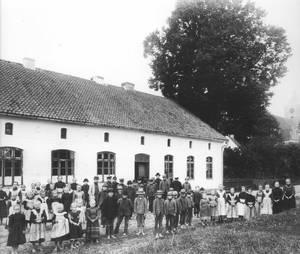Construction and Representation of a European Historical Space in Germany, Poland, Lithuania and Russia since 1900
East Prussia - Warmia i Mazury (Warmia and Mazury) - Oblast' Kaliningrad (Kaliningrad Oblast) - Mažoji Lietuva (Little Lithuania): Already the different names indicate that this is an unusual region in northeastern Europe. First, it existed in several historical periods as an exclave and as such today also influences the relationship of the European Union with Russia. Second, in the aftermath of World War II, not only did nation-state borders shift, but there was also an almost complete "exchange" of populations. Third, this resulted in profound ruptures in the cultures of remembrance.

-
Methodology
The project used textbooks as a source to examine, for the period since 1900, how a European region with multiple attributions and an extremely fractured recent history has been constructed, nationally appropriated, and represented through different memory-cultural narratives. The international comparative textbook analysis was a first step in breaking down the nation-state fixation of textbooks, as the different ways of seeing the region were to be examined for the extent to which they exhibit cross-border and integrative elements. In a second step, the scientific analysis led to the creation of a multilingual Internet platform. Here, sources are presented that can shed new light on facets of the history of this multicultural region and provide impulses for a dialogical elaboration of European history in the classroom.
-
Results
Project volumes:
- Stephanie Zloch and Izabela Lewandowska (eds.): Das ,Pruzzenland' als geteilte Erinnerungsregion. Construction and Representation of a European Historical Space in Germany, Poland, Lithuania and Russia since 1900 [Georg Eckert Institute - Leibniz Institute for International Textbook Research publication series, vol. 135], Göttingen 2014 www.v-r.de/de/das_pruzzenland_als_geteilte_erinnerungsregion/t-1/1032965/
- Izabela Lewandowska and Stephanie Zloch (eds.): Ziemie pruskie w podręcznikach Polski, Niemiec, Litwy i Rosji. Porównawcza analiza regionalnych konstrukcji tożsamości w XX-XXI wieku, Olsztyn 2013.
Contributions to journals and anthologies:
- Stephanie Zloch: Ideas of Landscape Influenced by Forced Migration: The Historical Region East Prussia in German, Polish, Russian and Lithuanian Textbooks, in: Martin Zückert and Heidi Hein-Kircher (eds.): Migration and Landscape Transformation. Changes in Central and Eastern Europe in the 19th and 20th Century [Publications of the Collegium Carolinum, vol. 134], Göttingen 2016, pp. 153 - 174.
- Stephanie Zloch: Minorities in Context - a New Form of Regional History? Textbook Analysis and Teaching Materials on the "Pruzzenland," in Gerhard Seewann and Robert Maier (eds.): German Minorities in Focus. Textbooks and Textbook Projects on the History of Germans in Individual European Countries [Eckert. Dossiers, vol. 5], 2015, pp. 108 - 123 repository.gei.de/bitstream/handle/11428/126/ED5_dt_Minderheiten_Pruzzenland.pdf
- Stephanie Zloch: Ostpreußens Nachleben. Formation or Construction of Regional Identity among Children and Adolescents in Polish-Russian Comparison from 1945 to Today, in Burkhard Olschowsky, Robert Traba, Matthias Weber, and Andrea Huterer (eds.): Region, State, Europe. Regionale Identitäten unter den Bedingungen von Diktatur und Demokratie in Mittel- und Osteuropa [Schriften des Bundesinstituts für Kultur und Geschichte der Deutschen im östlichen Europa, vol. 50], Munich 2014, pp. 87 - 100.
- Simone Lässig: Spaces and Borders. Außenperspektiven und Innenansichten durch die Linse des Schulbuchs, in: Geschichte in Wissenschaft und Unterricht, 64, 2013, pp. 6 - 12.
- Stephanie Zloch and Izabela Lewandowska: Border Crossings in the Textbook, in: History in Wissenschaft und Unterricht, 64, 2013, pp. 30 - 45.
- Stephanie Zloch: The area between the Vistula and the Memel, in: Historie. Jahrbuch des Zentrums für Historische Forschung Berlin der Polnischen Akademie der Wissenschaften, 5, 2011/12 (thematic issue: regional contexts), pp. 188 - 194.
- Stephanie Zloch and Izabela Lewandowska: Polsko-niemiecki projekt "Pruzzenland. Regionalne konstrukcje tożsamości w podręcznikach szkolnych Niemiec, Polski, Litwy i Rosji," in Zapiski Historyczne, 77, 2012, pp. 103 - 118 [with English abstract].
- Stephanie Zloch: The Former East Prussia in History Teaching. Ein Vergleich deutscher, polnischer und russischer Schulbücher/Byvšaja Vostočnaja Prussija v prepodavanii istorii (na materiale nemeckich, pol'skich i russkich učebnikov), in: I. I. Devjatajkina (ed.): Kul'turnaja pamjat' i memorial'nye kommunikacii v sovremennych učebnikach i učebnoj literatur: Opyt Rossii i Zapadnoj Evropy. Sbornik dokladov i materialov meždunarodnoj konferencii (Saratov, 25 - 28 sentjabrja 2001 g.), Saratov 2012, pp. 358 - 376 [German/Russian].
- Stephanie Zloch: Vergessen und neu entdeckt: Das ehemalige Ostpreußen als imaginierter Raum im Geschichtsunterricht. A comparative analysis of historical narratives and didactic concepts using the examples of Germany, Poland and Russia, in: Zeitschrift für Geschichtsdidaktik, 10, 2011, pp. 22 - 42.
- Stephanie Zloch: Jewish History in the Prussian East, in: Eckert. Das Bulletin, H. 10, Winter 2011, pp. 18 - 19.
Workshops
- "The 'Pruzzenland' as a Fractured Region of Memory. Construction and Representation of a European Historical Space in Germany, Poland, Lithuania and Russia since 1900", 1st working meeting of the partner groups Braunschweig and Olsztyn, 2 - 4 March 2011, Braunschweig.
- "Between Nogat and Memel. What do students in Germany, Russia, Poland and Lithuania learn about this common historical meeting space?", November 28-30, 2007, Braunschweig (see conference reports in Eckert. Das Bulletin and on H-Soz-u-Kult).